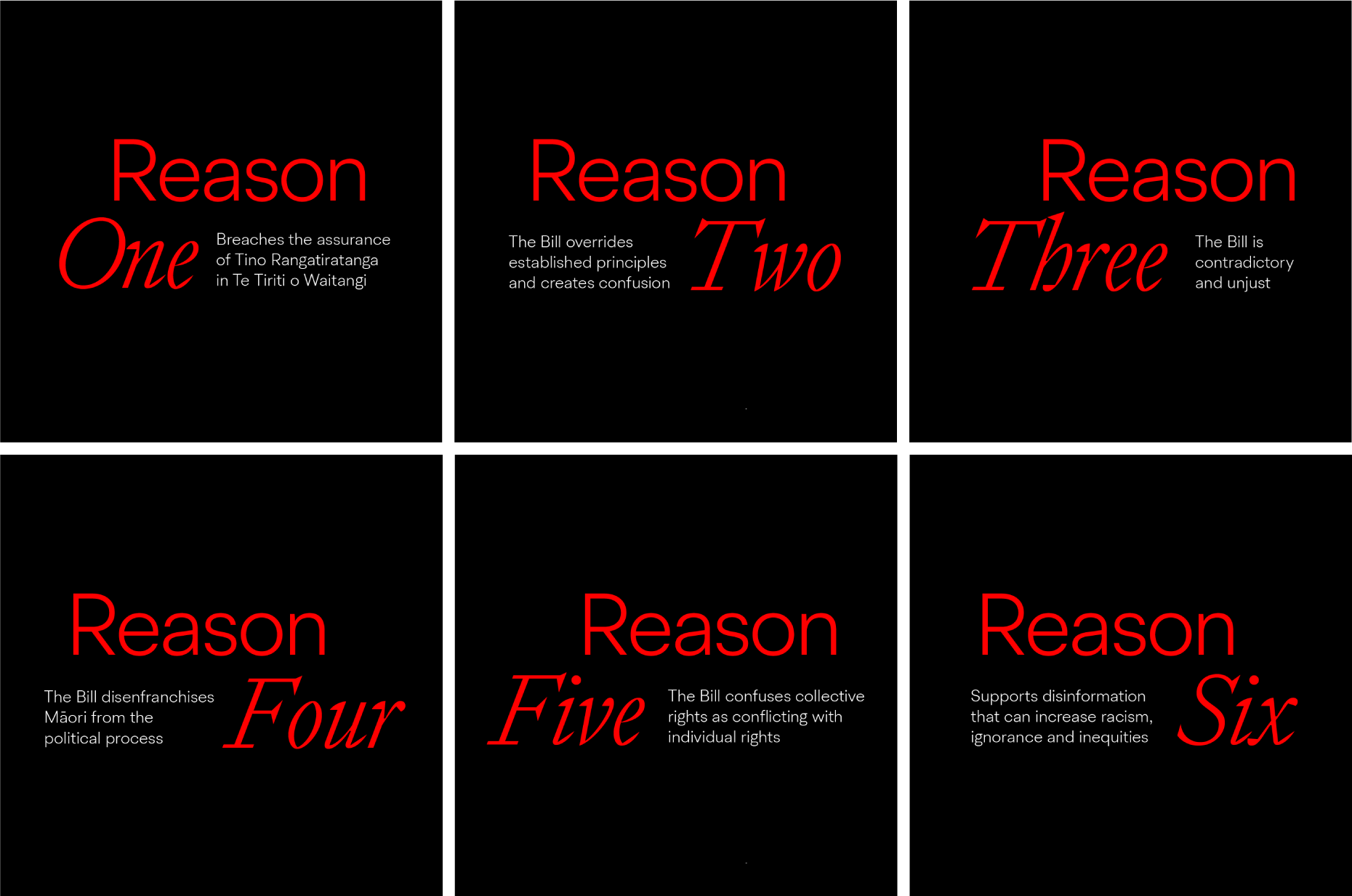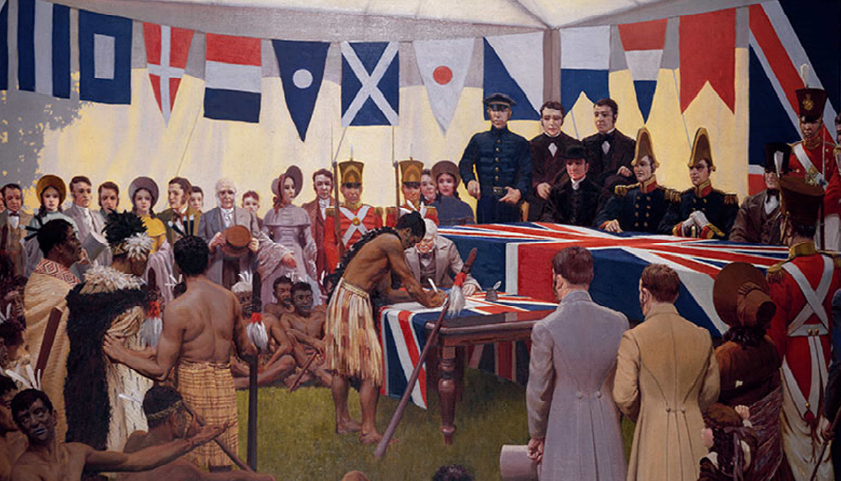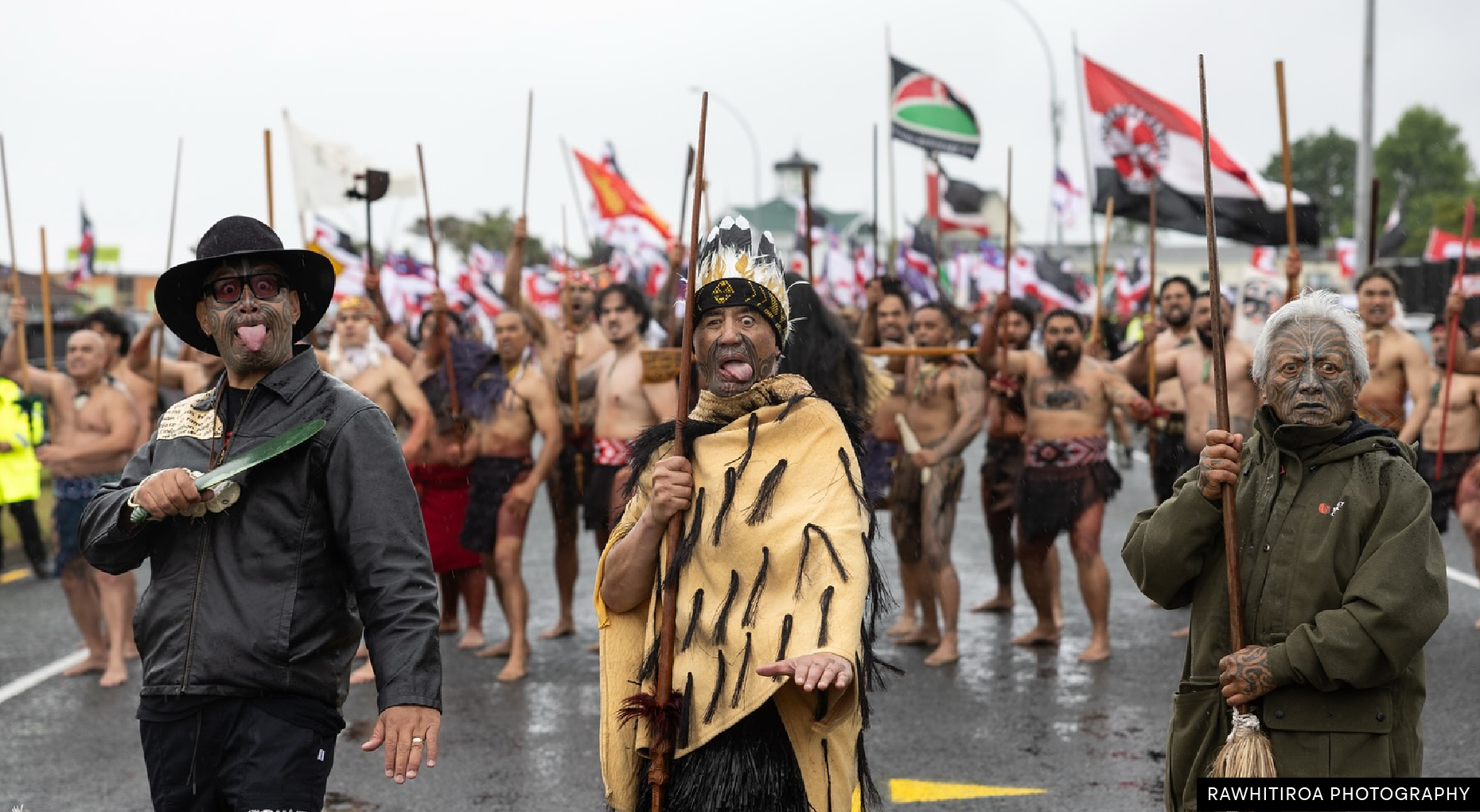
Section 6 Principle 1 of the Bill states that the Executive Government of New Zealand has full power to govern. What this ignores is Article 2 of Te Tiriti that protected the collective rights of hapū and iwi to exercise “tino rangatiratanga”. The word “tino” being an intensifier, meaning “absolute” or “ultimate”. In other words, there is no limit placed on the tino rangatiratanga or sovereignty of hapū and iwi. For this Bill to represent the principles of The Treaty, it would need to define clearly the limits on the power of the Executive Government of New Zealand and how it would work in good faith with the exercise of tino rangatiratanga by hapū and iwi.
Constitutional change needs to acknowledge that hapū and iwi did not cede sovereignty, but agreed to two spheres of power operating in New Zealand. The tino rangatiratanga sphere led by hapū and iwi and the right for the Crown to manage her citizens, called “Kāwanatanga” (or governorship) in Te Tiriti. Any attempt to establish principles based on Te Tiriti should clarify how these two systems of power work in good faith together for the betterment of all New Zealanders.
The overarching objective of the Bill is stated as defining the principles of Te Tiriti, to achieve greater certainty and clarity on how the Crown gives effect to it. What the Bill ignores is that the New Zealand courts and The Waitangi Tribunal have established principles over the past 50 years, along with scholarly work of legal, cultural and political experts. Principles are inherently broad, need skill to apply meaningfully and require both the Crown and Māori to work in good faith. The Waitangi Tribunal has already defined principles, which include:
- Genuine partnership between Crown and Māori
- Active protection of Māori rights by the Crown
- Effective participation of Māori in the political process and in decisions that affect them
- Redress for breaches of Te Tiriti
The Bill does not state principles that give effect to Te Tiriti, or how the Crown and Māori navigate in good faith solutions.

Section 6 Principle 2(1) recognises the rights hapū and iwi Māori had at the time they signed Te Tiriti, but does not state what they are, or how the signing of Te Tiriti affected those rights. If the Bill intends to create clarity, it must state what those rights are and how they are given effect in our constitutional arrangements.
Further, this clause is rendered incomprehensible by the following clause Section 6 Principle 2(2) which then negates hapū and iwi rights protected under Te Tiriti if they differ from the rights of non-Māori. Therefore, all Māori rights at the time of signing Te Tiriti are null and void, as they clearly differ from the rights of non-Māori.
This creates a set of contradictions in the proposed legislation. It also freezes Māori rights as at 1840, but enables non-Māori rights to continue to evolve and take on new effects as we adjust and respond to new ways to achieve equality, fairness and justice.
The explanatory note says the Bill intends to open a national debate. Section 2 of the Bill proposes a referendum to ask the public if they support the Principles of The Treaty of Waitangi Act 2024 coming into force. This does not enable a national debate. The referendum asks a majority of non-Māori to decide the rights of Māori by ticking a box yes or no.
There has been no consultation with Māori about what they would consider appropriate principles that would create more clarity for our constitutional arrangements. There is no mechanism to inform New Zealanders about the issues or challenges faced by Māori and Crown trying to work together. Instead, it gives the majority, who are non-Māori, to determine whether the rights protected in Te Tiriti should be removed. Te Tiriti protections are there to ensure that the democratic process does not unjustly remove Māori rights.
The rights of Māori pre-exist Te Tiriti and protected by Te Tiriti. Only the two parties to Te Tiriti, tangata whenua and the Crown, can amend what Te Tiriti affirms. It is these parties who should be navigating together how to best define any principles intended to give effect to Te Tiriti.

The Western Legal system acknowledges individual rights. These include the Human Rights Act 1993 and New Zealand Bill of Rights Act 1990. These give effect to rights such as the right to freedom of speech and the right of association. These rights protect the individual and when groups are persecuted, they can also protect members of a persecuted group.
Te Tiriti assured all New Zealanders, whether Māori or non-Māori that they will have equality under the law. New Zealanders have equal rights.
The way this Bill is promoted by Act supports the idea that somehow New Zealand is worse off by having some citizens having more rights than others. The sound bite sounds great and seems evidently true. But, it creates a confusion between collective and individual rights.
Māori collective rights, protected by Te Tiriti do not limit any New Zealanders access to equal individual rights. But, this tends to be the misunderstanding perpetuated by Act’s policies and this Bill. In reality, what Te Tiriti protects is a collective right to be self-determining - tino rangatiratanga. Māori collective tino rangatiratanga does not limit or override any other New Zealanders individual freedom or rights.
As a result of the above, promoting the idea that somehow Māori collective rights limit a non-Māori from having rights promotes racist stereotypes that lead to continued negative outcomes for Māori.
Further, it ignores our history as to why the Crown has responsibilities to Māori due to breaches of Te Tiriti. Māori had large amounts of their resources, taken from them by force, or by legislation in ways that breached Te Tiriti. Māori had their culture suppressed in ways that negatively affected Māori wellbeing, education and engagement with society. Racism has negatively affected Māori in every statistic - from health, to education, to incarcerations, home ownership and many others.
Returning stolen resources is not a “special privilege” that unjustly prejudices non-Māori. Agreeing to co-governance over a resource that was stolen by Māori is not unjust to other New Zealanders. We need to educate our nation on our history, so people can understand why Te Tiriti is still relevant and part of creating a fair and just society.
This Bill proposes to institutionalise ignorance of our real history and what Te Tiriti says, or how it should be applied. It seeks to limit Māori access to the political system to achieve equity and fairness in a system that has oppressed them. It effectively sustains the hand of the thief to retain stolen resources and maintain economic and political hegemony over Māori.

- The Treaty Principles Bill should be abandoned.
- The Crown should constitute a Cabinet Māori - Crown relations committee that has oversight of the Crown’s Te Tiriti Policies. This should not be considered by the Social Outcomes Cabinet Committee.
- The Crown should consider a process in partnership with Māori to undo the damage to the Māori - Crown relationship and restore confidence and honour of the Crown.
To read the Treaty Principles Bill, click here
To make a submission, click here. Submissions close 7 January 2024



